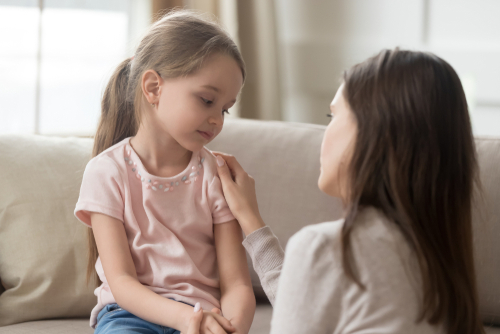If you have children, they will try to make sense of the break-in, just like the adults in the house. It can be confusing and frightening for children, and they are likely to need help with their feelings and understanding what has occurred. They may also take it all in their stride. Remember, even children respond in their own way and there is no right or wrong way to feel or process this type of event.
After the immediate practicalities of a theft have been managed, be prepared for conversations with your kids about the break-in. Their age will influence how you will discuss the event. Older kids can have more details about the break-in, but for young children, less detail is better. Aim to give a brief factual overview of what occurred, for example: “Some bad people came last night and took some of our things, so the police are coming to talk to us about it. They will try to catch the people who did this.” See how your children react to this information and acknowledge their feelings; you might need to gauge what their feelings actually are, as they might not have the words for it. Then giving a verbal acknowledgement will help them make sense of their feelings, for example:
-
-
- “You look a bit confused; this is a confusing thing to have happened.”
- “I can see you’re worried.”
- “It’s ok to be sad.”
- “Yes, this was frightening.”
- Or any other reaction or emotion your child displays.
-
It is also be helpful to follow this up with reassurance and to provide a sense of security going forward. Here are some examples:
-
-
- “Mummy/Daddy/Caregiver are here for you.”
- “Do you need a cuddle?”
- “We can always replace what was taken; it is more important that we are safe and together, which we are.”
- “We are taking steps to protect ourselves, such as by telling the police.”
- “The police are on our side and trying to catch the thieves. They are here to help and protect us.”
- “We are replacing the things that the thieves took.”
- “Let’s go tell our neighbours what happened so we can help them stay safe.”
- “We are going to put new locks on our doors [or other security measure] so this won’t happen again.”
-
Of course, you don’t need to say all of the above- one or two reassuring statements are likely to do the job. Children may have a truckload of questions about the break-in; allow them to ask you these. Be prepared to discuss what happened repeatedly whilst your child/ren try to understand what has happened.
Be prepared for your child/ren to be more emotional or clingy, or to have trouble sleeping. They may want to sleep with you, to spend more time with you, and need more reassurance from you. Their behaviours are telling you they don’t feel safe and need more of you. Give them what you can: allow them to sleep with you (or nearer you) in the short term; continue to provide acknowledgement of feelings and reassurance; spend what time you can with them. Making these efforts in the aftermath of a break-in means they will feel less anxious, and then they too can return to normal life. Their increased need for comfort will subside with time, if they have this need met.
This is an excerpt from the e-book ‘Feeling Comfortable In Your Home: How to cope with the fear of break-in, and recover after a break-in’.

